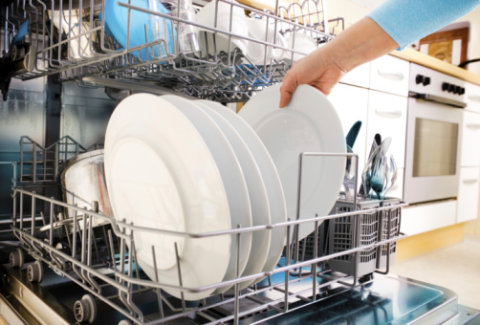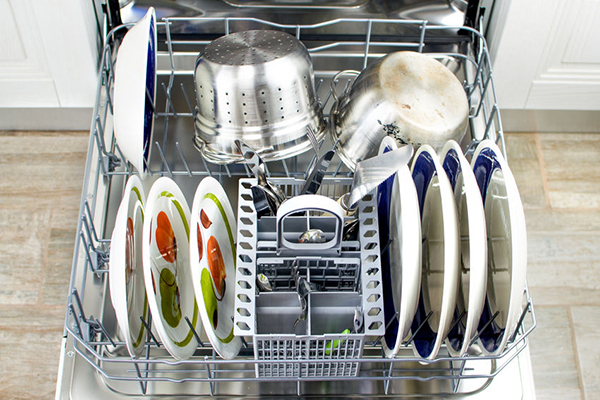Dishwashers need to be fitted with a running water line to directly use the water required to do a crystal bright wash. Dishwashers come at different prices are offer various services.
The universal function, of course, is washing the dishes! But there are few things you might confuse or have doubts about, like how to set it up! After setting it up, you might still need some knowledge to understand how these dishwashers’ function.
The most common doubts that bugs almost everyone’s minds are about the water. How much water does it consume to wash? Does it run on hot water? Do dishwashers run on cold water? These are logical even if you had used a dishwasher already and upgraded to a more sophisticated one.
The Sophistication
The optimal solution is always to use lukewarm water. Many people use two connections, one of the hot water and one cold, to mix them for lukewarm water to clean.
But it is not always the case because as you upgrade to higher and more expensive dishwashers, they come with automatic temperature control. These new sophisticated have temperature control and heat the dishwasher to the temperature you need.
You can leave the concern about what kind of water you need to use because it knows! And few even have a water softening technology, so if you are up to purchasing a high-end model and the budget is unlimited, you do not need to worry about anything at all!
The Less Sophisticated
If you have purchased a mid-tier dishwasher in between cheap and expensive, you need to worry about a few things and let the washer do the remaining. The mid-tier has different segments to do different jobs, and they even have different needs. These mid-tier dishwashers need cold water to rinse the dishes.
If you run cold water into the washer, you can still use them for rinsing. Also, people have reported that using cold water gave them better results. Because it does not change the temperature, but it can still get them lukewarm, which does the job.
The Least Sophisticated
Now, it is a cheaper and least complicated model that you own. It is alright to save and purchase a cheaper one if you are trying to be frugal. But the problem is the features are toned down a lot. It is like stripping off a knight’s armor! This stripping down decreases the number of jobs those washers do and increases the tasks you need to do manually.
The less the price becomes, the more your responsibilities increase; so does the maintenance. If you have a cheap dishwasher, it is most likely that it does not have any temperature controls. It would be best if you made sure about the doubt you had. “Do these cheap dishwashers run on cold water?” This is the right question, as all other models can either run or manage on cold water.
Is it Okay to Run Cold Water?
It is entirely okay to run cold water into any dishwasher, but as cold the water, as long it takes for rinsing. When you power on the washer and start rinsing the dishes, you can notice that it might take a few more rounds of rinsing if you used cold water.
The number of rounds is longer with the temperature; the water gets lukewarm after multiple rinsing rounds. It takes a long time for that to happen, unlike mid-tier dishwashers. It is not problematic to run cold water, but it sucks in all your patience!
How Hot Does the Water Need to Be?

If your dishwasher has no temperature control, of course, for being less sophisticated one, you need to choose the temperature you need to use manually. There is not even a dial, by manual, that you must monitor water heating. If you have two separate lines for hot and cold water, it is easy to plug in the hot water line to the dishwasher.
But if you do not have such an in-built heater and have a heater separately, you need to be careful. It would be best if you did not let the water get too hot. Too cold water is not a problem, but too hot water invites a lot of issues. A pipe problem is the most common problem, and many other issues will get triggered too.
If the water goes into the heater and then to the dishwasher, be alerted to monitor the temperature. The optimal temperature used in almost all the dishwashers is 120 degrees Fahrenheit, nearly 50 degrees Celsius. Many dishwashers may withstand different temperatures, but 120 is where you need to get alerted. It is where you need to set that alarm if your heater has one.
If you look at any dishwasher manual, they suggest using the hot water line to the washer before starting the cleaning because it is best used with hot water regardless of many’s subjective opinions.
The Sophisticated Cheap Ones!
Yes! They exist! The brands that are not famous do offer sophisticated dishwashers that have temperature control on them. You can use any tap to fill the washer. But as it is cheaper, the features might get weird.
And many less expensive sophisticated heaters function a bit different compared to their expensive cousins. These do have temperature controls, but the functioning is different. The more expensive and branded washers use a lot of power to grill the water quickly to the temperature they need to rinse the dishes.
But these cheaper alternatives drag even a lot more power and take a long time to get the water heated. You can leave the machine on and do something else while the water is hot enough. There are complaints of users who had reported a waiting time of one hour before the water got warm enough for the washer.
But this waiting time is the price we have paid when we have purchased a cheaper alternative. And it is okay if you adjust for its functioning in its way without any comparisons. These are the optimal solutions if you do not want to spend more and want more!
Wrap-up
If you ask, “do dishwashers run on cold water?” then the answer is, yes, they do run on cold water. But the question is not, do they run? But how do they run? You can get a lot of perspective reading the above words on how the different dishwashers use cold water.
The summary is that more expensive washers have more features to use and do no matter what water you use. You can use cold water, hot water, and even hard water as they have an in-built water softener. Cheaper versions are toned down off all the neat features and make your time harder.
Of course, the water softener is now a feature in almost all the dishwashers, but the temperature control is not what you get. Many dishwasher companies suggest their users use hot water even though there is temperature control on them.
So, regardless of you purchasing expensive or cheaper versions, the usage of hot water is inevitable. When the makers are suggesting using hot water, there is no excuse to use cold waters. Of course, some people have used cold water and got no problems, but what testimony is more significant?
The makers or is it of the users? Given a thought, both seem equally important! It is totally up to you to choose what water to use. If you are using a washer with temperature control, it does not matter. But if you have a cheaper one, you can use the cold water to wait for long hours for the water to get heated.
If you want things to be quicker, better purchase expensive and standard washers with more features. Because the cheaper ones may seem like saving in the beginning, but running for hours, the energy they consume takes the same toll on you.
A one-time investment to purchase a higher and more feasible dishwasher might save you a lot of trouble and help you save more energy!

